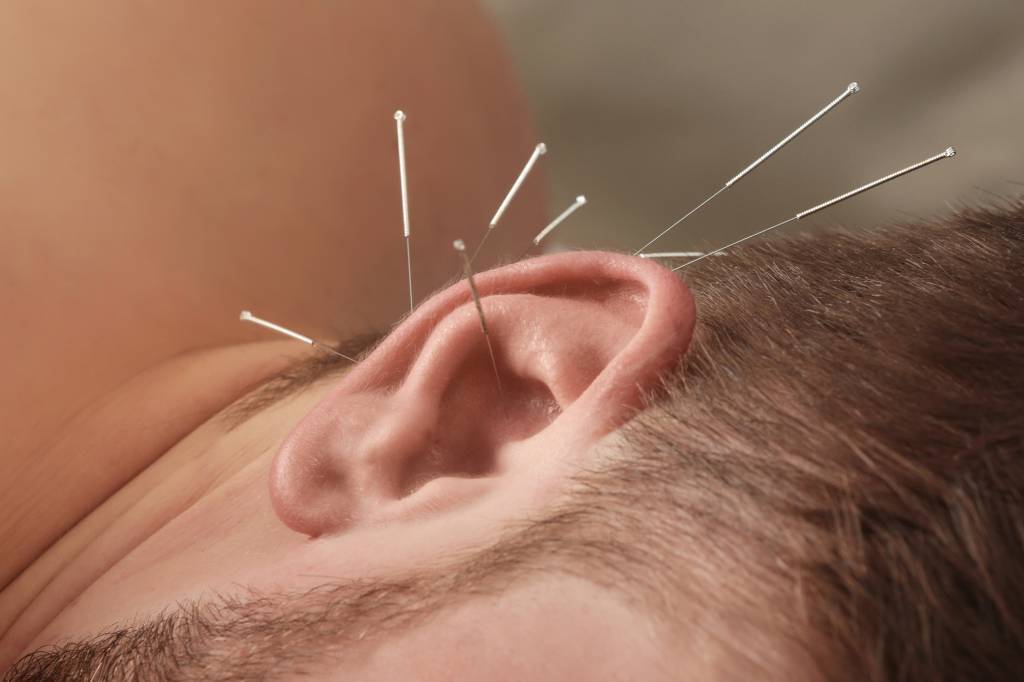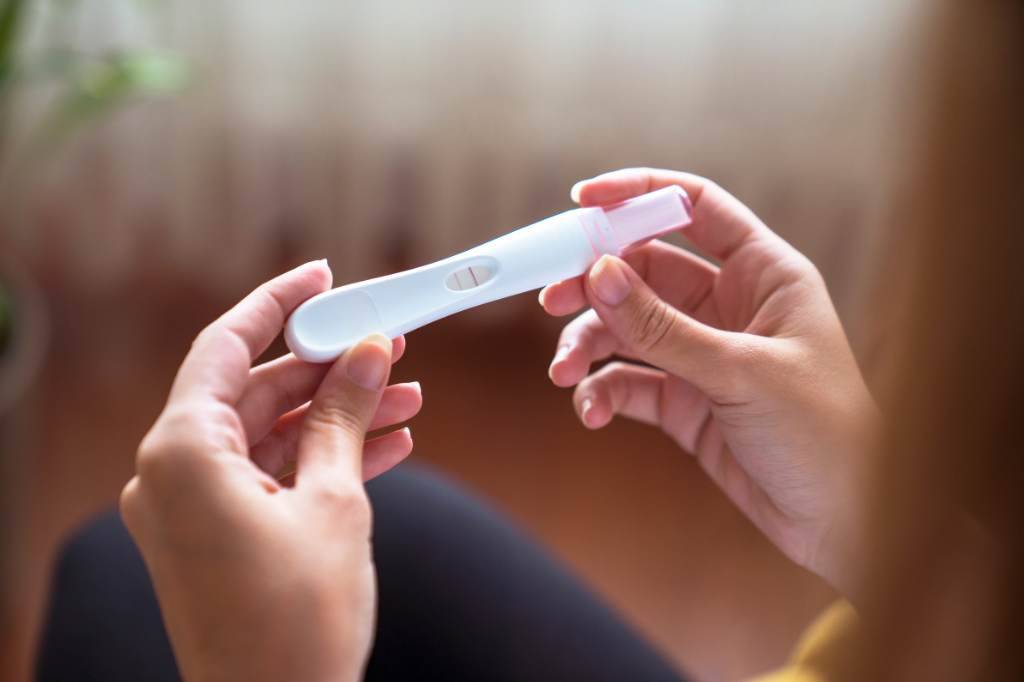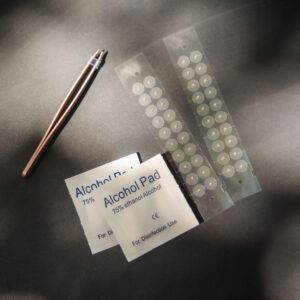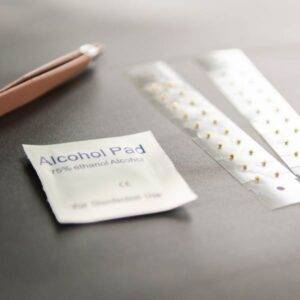A common misconception among people who are new to ear seeds, acupressure and auriculotherapy is that ear seeds are a type of acupuncture.
Just look at a few popular Google search queries:
- Do acupuncture ear seeds work?
- How long do you leave ear seeds in for acupuncture?
- What are the benefits of acupuncture seeds?
- Ear seeds for auricular acupuncture
But what is acupuncture? And how are ear seeds and acupressure different? Read on to find out!
What is acupuncture?
Acupuncture is an ancient practice, rooted in Chinese tradition, that involves using needles to stimulate specific points along the body’s pathways. These points correspond to different areas or systems of the body, and acupuncture therapy is therefore used to restore balance and promote healing in the body.
The needles used for acupuncture are tiny, ranging from about half an inch to three inches in size. Their size varies based on the specific treatment and how deep they need to be inserted based on the targeted acupuncture point.
Acupuncture needles are much finer than your standard injection needle, so the sensation that comes from them is different too. Most people report minimal to no pain during acupuncture. You might feel a gentle, dull ache, tingling, or a mild sensation as the needle finds its place.

Ear seeds: acupuncture alternative
Ear seeds are an alternative to acupuncture, but they’re not acupuncture. There are some similarities between the two different treatment modalities — and by now, you might have already guessed some main differences, too.
The similarities between acupressure and acupuncture
Acupressure and acupuncture have foundational commonalities, originating from Traditional Chinese Medicine. Most obvious are the placement points used, which correspond to different areas or systems of the body. Both are used on the ears, among other body parts, and both have been studied and shown to be effective for various conditions and ailments.
Both techniques emphasize a holistic approach to healing, focusing on the individual’s overall well-being rather than just alleviating isolated symptoms. They take into account the interconnectedness of the body, mind, and spirit, and are a popular therapy of choice for those into health and wellness.
The differences between acupressure and acupuncture
First, acupuncture uses needles, whereas acupressure does not. Acupressure via ear seeds is non-invasive. Rather than using needles to pierce through the skin, ear seeds attach to the ear using adhesives. The seeds are small beads or pellets that put “pressure” on ear points. Acupressure, therefore, is the term used with ear seeds instead of acupuncture.
Second, auricular acupuncture treatment requires a high degree of training, specialization, and practice by a professional. In Adverse Events of Auricular Therapy: A Systematic Review, the paper’s authors acknowledge that auricular acupressure is much easier to access, and therefore, typically much less expensive, than acupuncture is. The ear seeds and associated placement charts are easy to come by, but even if you don’t have seeds, stimulation with a finger (if you know where) is still a viable option.
Third, when put in a head-to-head matchup, acupuncture and acupressure are often responsible for different outcomes, one almost always being more favorable than the other. For instance, in one study, acupressure was more successful in reducing pain from dysmenorrhea than acupuncture was. In another study, acupressure was the leader over acupuncture in reducing sleep disturbances in cancer patients. Conversely, researchers found acupuncture to be more effective than acupressure in managing post-chemotherapy fatigue in cancer patients.
In their analysis of adverse effects from various auriculotherapy treatments, authors Tan, Molassiotis, Wang and Suen sang the praises of auricular acupressure over other treatment modalities, including acupuncture. Among their reasons for preferring acupressure was the lower prevalence of adverse effects, including local pain and dizziness.
To sum it up
So, are ear seeds acupuncture? To that we say, no, but they’re in the same family. Acupressure and acupuncture have their definite differences, but they are both rooted in Traditional Chinese Medicine and are suggested as options for anyone seeking natural treatment approaches for optimal health and wellness. Just remember: results vary, and always consult with a trusted healthcare professional before starting or stopping treatments and therapies.
Happy seeding!
References:
Chen, M. N., Chien, L. W., & Liu, C. F. (2013). Acupuncture or Acupressure at the Sanyinjiao (SP6) Acupoint for the Treatment of Primary Dysmenorrhea: A Meta-Analysis. Evidence-Based Complementary and Alternative Medicine, 2013, Article ID 493038, 8 pages. https://doi.org/10.1155/2013/493038
Cheung, D. S. T., Xu, X., Smith, R., Takemura, N., Yeung, W. F., Chan, W.-l., Lao, L., & Lin, C.-C. (2023). Invasive or noninvasive? A systematic review and network meta-analysis of acupuncture and acupressure to treat sleep disturbance in cancer patients. Worldviews on Evidence-Based Nursing, 20, 202–211. https://doi.org/10.1111/wvn.12617
Molassiotis, A., Sylt, P., & Diggins, H. (2007). The management of cancer-related fatigue after chemotherapy with acupuncture and acupressure: A randomised controlled trial. Complementary Therapies in Medicine, 15(4), 228-237. https://doi.org/10.1016/j.ctim.2006.09.009
Tan, J. Y., Molassiotis, A., Wang, T., & Suen, L. K. (2014). Adverse events of auricular therapy: a systematic review. Evidence-based complementary and alternative medicine : eCAM, 2014, 506758. https://doi.org/10.1155/2014/506758




